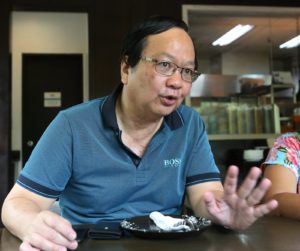Cebu businessmen to gov’t: Listen to investors’ pleas Biz leaders worry as House’s Train 2 version spooks some Japan firms in Cebu

Antonio Chiu, Cebu Chamber of Commerce and Industry president/ CDN PHOTO
Government should start listening to the pleas of investors regarding the second tax reform package, with more expressing intent of pulling out should their incentives be removed, Cebu business leaders say.
In Cebu, some Japanese locators have already signified their plans of pulling out should the tax incentives they currently enjoy be removed.
MCCI exec
Steven Yu, Mandaue Chamber of Commerce and Industry (MCCI) vice president for external affairs, said that most of the Japanese firms accredited by the Philippine Economic Zone Authority (PEZA) in Cebu are into high-value manufacturing.
“They will need the continuance of their current incentives to stay afloat in their operations here in Cebu. It is indeed alarming that a quarter of them will want to pull out from Cebu if Train 2 is passed and signed in its current House version,” said Yu in an interview on Wednesday.
“The government should heed their concerns and put in some revisions in the bicameral committee,” Yu added.
In a recent survey done by the Japanese Chamber of Commerce and Industry of Cebu Inc. (JCCICI) on its 99 member firms, they found that more than a quarter of their members planned to pull out their investments in the country if the second tax reform package is approved.
According to the survey respondents, who are registered under PEZA, they were offered the tax perks to offset the high cost of doing business in the Philippines.
These same exact perks are now at risk with the proposed second tax reform package which seeks to “modernize and rationalize” tax incentives.
Ensure competitiveness
For other local business leaders, while revisiting the country’s tax incentives system is important and needed, the government should first ensure the country’s competitiveness in attracting foreign investors.
CCCI chief
Antonio Chiu, Cebu Chamber of Commerce and Industry (CCCI) president, said that the second tax reform bill approved by the House of Representatives had set corporate income tax (CIT) at 25 percent from the current 30 percent.
But Chiu said this number is still much higher than most other countries in Southeast Asia which are currently around the 20 percent mark.
“We should never lose focus on making the Philippines competitive otherwise foreign investors will simply go to another country who will welcome them,” said Chiu in a separate interview on Wednesday.
“The biggest victims will be our own local business community and the Filipino workers who want a decent job in their own country so that they can be close to their family,” he added.
Other factors
Aside from the high cost of doing business in the country, Chiu said that there are many other factors working against investors in the country.
These include “horrible infrastructure” which make the cost of transporting materials and goods expensive; corruption and red tape in both national and local levels; expensive power cost; property prices; and labor cost.
The second tax reform package, now called the “Trabaho” bill, was recently approved on third and final reading in the House of Representatives.
While it reduces CIT, export-oriented firms like those registered under PEZA are expecting to get a hit from the provisions of the bill.
Although the current version of the bill still offers tax perks like income tax holidays of a few years, it will eventually remove the 5-percent gross income earned (GIE) tax applied to PEZA-registered firms in lieu of all other taxes.
Gordon Alan Joseph, Cebu Business Club president, for his part, said he does not agree with the passage of a second package of the tax reform law.
FDIs
“We are not yet a competitive foreign investment destination. While FDI (foreign direct investment) had grown, we still lag behind our competitors – and please, not that this FDI growth occurred with investment incentives in place,” he pointed out.
Joseph was referring to the recent announcement of the Bangko Sentral ng Pilipinas that long-term equity investments from overseas registered net inflows of $5.8 billion for the first semester of 2018. This is a 42.4 percent increase from the $4 billion last year.
Based on JCCICI’s survey, 27 percent of their members said they might withdraw their investments in the country if the tax reform would be pushed without considering the “plight” of PEZA-registered firms.
Moreover, 17 percent said they might shift their operations overseas, while 29 percent might reduce their production scale which will “consequently reduce their labor force.”
The JCCICI conducted the survey from May to June 2018.
Disclaimer: The comments uploaded on this site do not necessarily represent or reflect the views of management and owner of Cebudailynews. We reserve the right to exclude comments that we deem to be inconsistent with our editorial standards.
